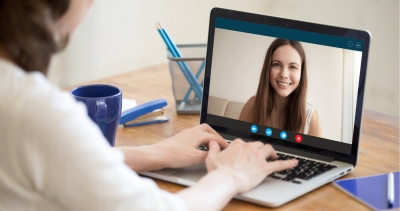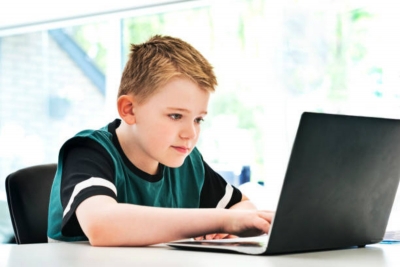ΕΚΠΑΙΔΕΥΤΙΚΑ ΝΕΑ
The new rules of remote recruiting: how to prepare for an online interview
The Covid-19 lockdown has completely reshaped the way companies operate – even once restrictions are eased, many expect remote working to stay. So how can you impress a potential new boss from home?
Candidates in their dressing gowns, dogs and children running about, partners in the background watching TV, or piles of dirty washing up on the kitchen counter – with 25 years in the recruitment sector, David Stone has heard it all when it comes to disastrous video interviews. “When people are working at home because it’s your personal space, a lot of candidates completely overlook the fact that it’s still a formal first meeting,” Stone, the founder of MRL Consulting Group, says. “It’s amazing what you see going on in the background.”
Holding interviews remotely – whether by phone or video – isn’t a new concept, particularly for companies that have built remote, international teams. Nor is the use of technology in the recruitment process, with an influx of artificial intelligence tools that source and screen candidates hitting the market in recent years. There are algorithms that can analyse candidates’ tone of voice, facial expressions, and speech patterns during video pre-assessments, scoring them against an ideal profile for that role. Graduates have reportedly spent thousands of pounds learning how to beat these systems.
But for many companies, still recruiting during the global Covid-19 lockdown, moving the process online can be a daunting prospect. Stone recommends all involved – recruiter and candidate – treat a remote interview like a traditional, face-to-face meeting as much as possible. “Get up, get showered, put a suit on,” he says. “Pay consideration to what can be seen on that camera behind you. Make sure you’ve got an hour’s worth of peace and quiet.” Some candidates may be more nervous appearing on video than they would be in person, he adds. “You’ve got to try and get past that. Build rapport, put them at their ease, get them talking about subjects they’re comfortable talking about so they relax.”
Ellie Wilson, the co-founder and operations director of Virtalent, has run hundreds of remote interviews since launching her virtual assistant service six years ago. She’s found the recruitment process much more efficient when it’s all online. “We can go from someone submitting an assessment to having the final interview and running background checks almost within 48 hours,” she says. “I certainly don’t think you lose anything just because you can’t shake that person’s hand. I ask the same questions to a candidate that I would if they were sitting right in front of me. For me, nothing changes – I try to extract the information that I need to be assured that this is the right person for the job: can I see this person working with us, working with our clients? Do they give me confidence?”
While recruiters may prefer to do the first round of remote interviews over the phone, Wilson says it is important to see the person you’re speaking to at some stage in the process. That doesn’t have to be via a bespoke HR platform – video conference tools such as Zoom, Skype, and Microsoft Teams work just as well. “If they’re going to be working remotely, you also need to be reassured they have the right set-up at home,” she adds. “I check that they have a dedicated desk area, they have an appropriate seat, and it looks free from distraction.”
Candidates and interviewers alike should switch on all equipment 15 minutes beforehand, think about getting the lighting and camera angle right, test microphones, and put phones and any push notifications on silent say flexible working consultant and executive coach Marilyn Devonish. “When speaking, look directly into the camera so the other person feels like you’re looking at them,” she adds, rather than getting distracted by your own image on the screen (Zoom has a “hide myself” option, which can help). She recommends interviewees also do a practise run-through with friends or family: “Think about making sure your personality comes out. So if you’re going for a job that needs a motivated self-starter, that’s what you’ve got to be when you’re on camera.” Candidates interviewed by video also have the luxury of being able to use printouts of the job description and any other reference notes without the interviewer’s knowledge.
Recruiters should be mindful of including more visual and linguistic cues than they might use in-person to show they’re following what the candidate is saying. “Things like saying ‘right’, ‘OK’, ‘great’,” Devonish adds. “If the sound drops, this is not the time to be scared or too polite – say: ‘I’m sorry, I missed that.’ Both sides need to make sure they can hear each other clearly.” A clear explanation for how the process will work should also be provided in good time, including the necessary passwords and access links. And always have a plan B. “Let them have a telephone number so that if the technology fails, they can call you. And if something does go wrong, watch how the candidate reacts – if they completely lose their head, that actually tells you a little bit about how they operate under pressure.”
Stone believes the Covid-19 lockdown could mark a seismic shift in the way companies operate going forward. “This episode has proven that you don’t have to stop in your entirety when something like this does occur,” he says. “We’ve got some clients who are interviewing remotely and then onboarding new recruits by video too, just having a laptop delivered to their house. They’re hiring highly skilled people having never met them in their lives.”
ΠΗΓΗ: THE GUARDIAN
Children’s mental health will suffer irreparably if schools don’t reopen soon
An educational psychologist says missing out on everyday emotional support networks is storing up long-term problems
Schools give much more to our children than merely opportunities to learn. They also promote the development of a child’s social-emotional and mental health needs. The longer children are not attending schools, the greater problems we are storing for them and the education system in the months and years ahead. Covid-19 is not equal disease.
UCL renames three facilities that honoured prominent eugenicists
London university removes names of Francis Galton and Karl Pearson from two lecture theatres and a building.
UCL has renamed two lecture theatres and a building that honoured the prominent eugenicists, Francis Galton and Karl Pearson.
The university said on Friday that the Galton lecture theatre had been renamed lecture theatre 115, the Pearson lecture theatre changed to lecture theatre G22 and the Pearson building to the north-west wing.
Keeping Lines of Communication Open During Distance Learning
Clear, positive messages from administrators can go a long way toward helping teachers working at home feel more connected.
You’ve considered all interpretations of your email’s content and feel secure that every critical detail is well thought out and explicitly stated. So you hit send and await your staff’s response. However, your intended message is lost, and teachers report being confused.
We’ve all been there, and times of high stress only increase the likelihood that messages will be misinterpreted or misunderstood.
How Teachers Can Make the Most of Their Unique Talents
Teachers can be more effective by uncovering and tapping into their individual combination of skills and interests.
As teachers, we enter our classrooms with diverse skill sets, talents, and attributes. During my first year as a teacher, I used the lesson plans that my mentor teacher handed down to me practically unchanged and taught all my lessons in the same manner as she did the previous year.


















